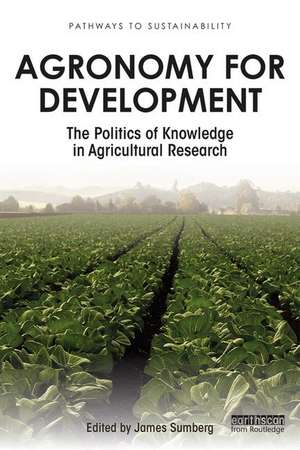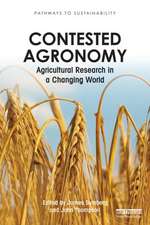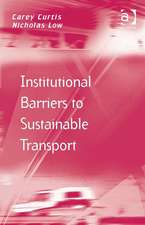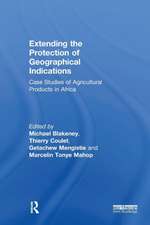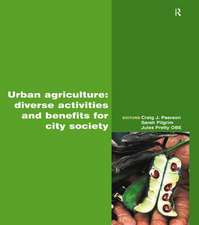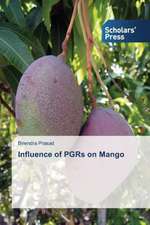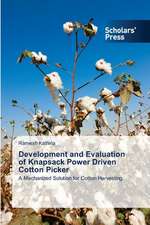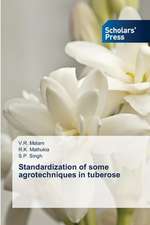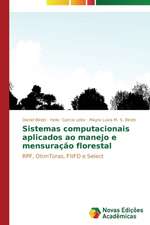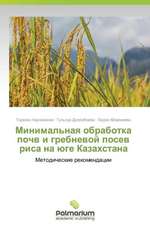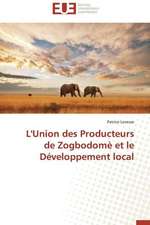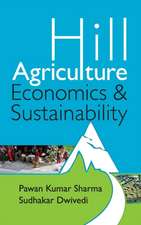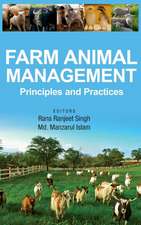Agronomy for Development: The Politics of Knowledge in Agricultural Research: Pathways to Sustainability
Editat de James Sumbergen Limba Engleză Paperback – 15 iun 2017
Knowledge politics within development-oriented agronomy set the stage for some models of agricultural development to be favoured over others, with very real implications for the food security and wellbeing of many millions of people. Agronomy for Development demonstrates how the analysis of knowledge politics can shed valuable new light on current debates about agricultural development and food security. Using bio-physical and social sciences perspectives to address the political economy of the production and use of knowledge in development, this edited collection reflects on the changing politics of knowledge within the field of agronomy and the ways in which these politics feed and reflect the interests of a broad set of actors.
This book is aimed at professionals working in agricultural research as well as students and practitioners of agricultural, rural and international development.
| Toate formatele și edițiile | Preț | Express |
|---|---|---|
| Paperback (1) | 240.16 lei 6-8 săpt. | |
| Taylor & Francis – 15 iun 2017 | 240.16 lei 6-8 săpt. | |
| Hardback (1) | 764.20 lei 6-8 săpt. | |
| Taylor & Francis – 21 iun 2017 | 764.20 lei 6-8 săpt. |
Din seria Pathways to Sustainability
-
 Preț: 257.71 lei
Preț: 257.71 lei -
 Preț: 266.11 lei
Preț: 266.11 lei -
 Preț: 256.68 lei
Preț: 256.68 lei -
 Preț: 169.51 lei
Preț: 169.51 lei -
 Preț: 275.30 lei
Preț: 275.30 lei -
 Preț: 323.23 lei
Preț: 323.23 lei -
 Preț: 485.40 lei
Preț: 485.40 lei -
 Preț: 317.30 lei
Preț: 317.30 lei -
 Preț: 273.35 lei
Preț: 273.35 lei -
 Preț: 274.20 lei
Preț: 274.20 lei -
 Preț: 320.20 lei
Preț: 320.20 lei - 26%
 Preț: 762.97 lei
Preț: 762.97 lei -
 Preț: 272.37 lei
Preț: 272.37 lei -
 Preț: 319.43 lei
Preț: 319.43 lei -
 Preț: 273.57 lei
Preț: 273.57 lei -
 Preț: 322.27 lei
Preț: 322.27 lei -
 Preț: 274.45 lei
Preț: 274.45 lei - 17%
 Preț: 213.33 lei
Preț: 213.33 lei -
 Preț: 244.02 lei
Preț: 244.02 lei -
 Preț: 469.56 lei
Preț: 469.56 lei -
 Preț: 317.48 lei
Preț: 317.48 lei -
 Preț: 317.30 lei
Preț: 317.30 lei -
 Preț: 363.96 lei
Preț: 363.96 lei -
 Preț: 314.21 lei
Preț: 314.21 lei -
 Preț: 275.26 lei
Preț: 275.26 lei
Preț: 240.16 lei
Nou
Puncte Express: 360
Preț estimativ în valută:
45.96€ • 49.91$ • 38.61£
45.96€ • 49.91$ • 38.61£
Carte tipărită la comandă
Livrare economică 22 aprilie-06 mai
Preluare comenzi: 021 569.72.76
Specificații
ISBN-13: 9781138240315
ISBN-10: 1138240311
Pagini: 216
Ilustrații: 6 Tables, black and white; 5 Line drawings, black and white; 5 Halftones, black and white
Dimensiuni: 156 x 234 x 15 mm
Greutate: 0.34 kg
Ediția:1
Editura: Taylor & Francis
Colecția Routledge
Seria Pathways to Sustainability
Locul publicării:Oxford, United Kingdom
ISBN-10: 1138240311
Pagini: 216
Ilustrații: 6 Tables, black and white; 5 Line drawings, black and white; 5 Halftones, black and white
Dimensiuni: 156 x 234 x 15 mm
Greutate: 0.34 kg
Ediția:1
Editura: Taylor & Francis
Colecția Routledge
Seria Pathways to Sustainability
Locul publicării:Oxford, United Kingdom
Public țintă
Postgraduate and ProfessionalCuprins
1. Knowledge politics in development-oriented agronomy (Jens Andersson, James Sumberg, John Thompson and Ken Giller) 2. ‘Agents without principals’: configuration and outcomes of agenda setting for public agricultural research in Africa (George Okongo and Laurens Klerkx) 3. Contested agronomy and the movement of agricultural technology: The situating and desituating of technological packages (Dominic Glover, Jean-Philippe Venot and Harro Maat) 4. Crops in context: negotiating traditional and formal institutions in local seed systems of maize and sorghum (Ola T. Westengen) 5. GM crops ‘for Africa’: examining contestation and knowledge politics in the Kenyan biosafety debate (Stephen Whitfield) 6. The sweet smell of ‘success’: contesting biofortification strategies to address malnutrition in Tanzania (Sheila Rao and Chris Huggins) 7. Systems research in the CGIAR as a multi-dimensional arena of struggle (Cees Leeuwis) 8. When the solution became a problem: strategies in the reform of agricultural extension in Uganda (Patience B. Rwamigisa, Paul Kibwika, Frank B. Matsiko, Margaret N. Mangheni and Regina Birner) 9. One step forward, two steps back in farmer knowledge exchange: ‘scaling-up’ as Fordist replication in drag (William G. Moseley) 10. South-South cooperation, third world solidarity and technocentric development: China and Brazil in Africa (Kojo Amanor) 11. Yields of dreams: marching west and the politics of scientific knowledge in the Brazilian Agricultural Research Corporation (Embrapa) (Ryan Nehring) 12. Beyond contested agronomy (Ken Giller, Jens Andersson, John Thompson and James Sumberg)
Recenzii
"As an agronomist working in development, I found Agronomy for Development to be very refreshing. This book enlarges the discussion around development agronomy and offers tools for a more meaningful engagement of the subject. This is a very timely contribution." — Professor Martin Entz, Department of Plant Science, University of Manitoba, Canada
"Progress in transforming agriculture and achieving food security will very much depend on whether good agronomy can be brought to scale. This requires re-thinking by everyone involved, including agronomists themselves. This book is a refreshing contribution to this debate." — Professor Achim Dobermann, Director, Rothamsted Research, UK
"Agronomy for Development: The Politics of Knowledge in Agricultural Research should be read by both agronomists and development professionals. Over the past 40 years, agricultural development has become increasingly competitive. The result is proposals that are comprised of bundles of win themes that are based on success stories rather than science. The high expectations of impact inevitably lead to disappointment. Through recent and relevant examples, Agronomy for Development discusses how to address these challenges." — Dr Tom Remington, Senior Technical Adviser, International Potato Center (CIP)
"Rethinking agronomy, for what purposes, by whom? These are the compelling questions at the heart of this book, through the lens of knowledge politics. Presented by the foremost thinkers in the field, this is mandatory reading for agronomists, food systems actors and all of those engaged in development and contestation." — Professor Sieg Snapp, Department of Plant, Soil and Microbial Sciences, Center for Global Change Science, Michigan State University, USA
"Progress in transforming agriculture and achieving food security will very much depend on whether good agronomy can be brought to scale. This requires re-thinking by everyone involved, including agronomists themselves. This book is a refreshing contribution to this debate." — Professor Achim Dobermann, Director, Rothamsted Research, UK
"Agronomy for Development: The Politics of Knowledge in Agricultural Research should be read by both agronomists and development professionals. Over the past 40 years, agricultural development has become increasingly competitive. The result is proposals that are comprised of bundles of win themes that are based on success stories rather than science. The high expectations of impact inevitably lead to disappointment. Through recent and relevant examples, Agronomy for Development discusses how to address these challenges." — Dr Tom Remington, Senior Technical Adviser, International Potato Center (CIP)
"Rethinking agronomy, for what purposes, by whom? These are the compelling questions at the heart of this book, through the lens of knowledge politics. Presented by the foremost thinkers in the field, this is mandatory reading for agronomists, food systems actors and all of those engaged in development and contestation." — Professor Sieg Snapp, Department of Plant, Soil and Microbial Sciences, Center for Global Change Science, Michigan State University, USA
Descriere
Over the last decade there has been renewed interest in food security and the state of the global food system. Population growth, climate change and food price spikes have combined to focus new attention on the technologies and institutions that underpin the production and consumption of food that is varied, nutritious and safe.
Knowledge politics within development-oriented agronomy set the stage for some agricultural development to be favoured over others, with very real implications for the food security and wellbeing of many millions of people. Agronomy for Development demonstrates how the analysis of knowledge politics can shed valuable new light on current debates about agricultural development and food security. Using bio-physical and social sciences perspectives to address the political economy of the production and use of knowledge in development, this edited collection reflects on the changing politics of knowledge within the field of agronomy and the ways in which these politics feed and reflect the interests of a broad set of actors.
This book is aimed at professions working in agricultural research as well as students and practitioners of agricultural, rural and international development.
Knowledge politics within development-oriented agronomy set the stage for some agricultural development to be favoured over others, with very real implications for the food security and wellbeing of many millions of people. Agronomy for Development demonstrates how the analysis of knowledge politics can shed valuable new light on current debates about agricultural development and food security. Using bio-physical and social sciences perspectives to address the political economy of the production and use of knowledge in development, this edited collection reflects on the changing politics of knowledge within the field of agronomy and the ways in which these politics feed and reflect the interests of a broad set of actors.
This book is aimed at professions working in agricultural research as well as students and practitioners of agricultural, rural and international development.
